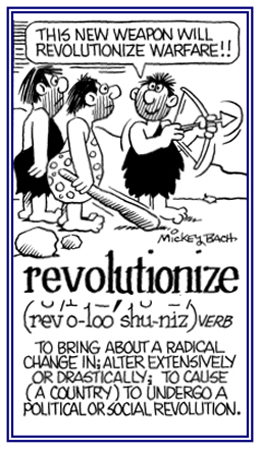volv-, volu-, -volve, volut-, -volute, -volution
(Latin: bend, curve, turn, turn around, twist, roll)
2. An attempt to overthrow the existing form of a political organization, the principles of economic production and distribution, and the allocation of social status.
3. A rebellion in which a government is overthrown; usually, by force, and a new group of rulers takes over.
Sometimes the whole social order is overthrown.
4. Any large-scale change in society; such as, the Industrial Revolution which was also a cultural revolution.The development of the microchip caused a revolution in the computer industry.
5. A drastic and far-reaching change in the ways of thinking and behaving.6. Etymology: from the late 14th century, originally referring to celestial bodies, from Old French revolution, from Late Latin revolutionem, revolutio, "a revolving"; from Latin revolutus, revolvere, "to turn, to roll back".
Latin volvere, "to roll" with the prefix re-, "again" produced revolvere, "to roll back, to turn", which when filtered through French, became the English term revolve in the 14th century; originally, meaning "to change" and only taking on the meaning "orbit" in the late 1600's.
Revolution also came into English via French, in the late 14th century, with the original meaning of "the action of a celestial body moving in an orbit".
Over a period of time, revolution came to mean, "turning around" or "change", and by 1600, it acquired the meaning of "overthrow of the established order".
2. Etymology: from Latin revolvere, "to turn, to roll back."

Go to this Word A Day Revisited Index
so you can see more of Mickey Bach's cartoons.
2. There are multivoltines.
Some species produce one, two, three, four, six, or even eight broods per annum, and in the commercial world are distinguished as, univoltines, bivoltins, trivoltins, quadrivoltins, etc.


